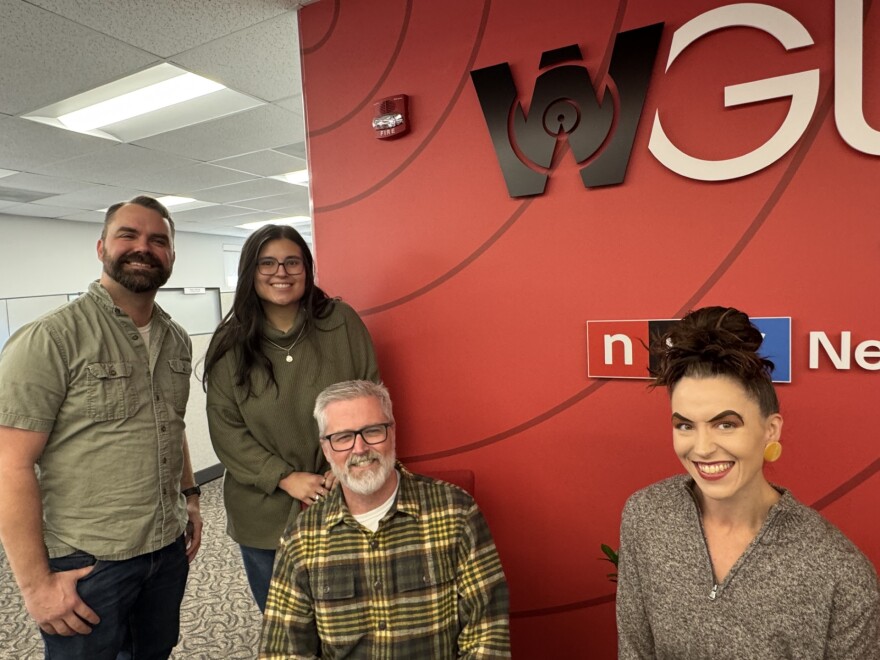The state's chief arts and humanities councils gathered cultural leaders from across Illinois last week to discuss successes and challenges in an evolving landscape for the sector.
A delegation from the Twin Cities represented the Town of Normal, McLean County Arts Center and Museum of History and Envisioning Justice, the latter a statewide program challenging mass incarceration through the arts with one of its hubs in Bloomington-Normal.
It was the first time arts and humanities educator Hannah Johnson attended the conference as a freelance cultural worker. Until April, she was Illinois Art Station’s executive director and previously worked at the McLean County Museum of History.
“It’s the first conference I’ve walked into where I didn’t have an affiliation under my name,” she said. “That in itself sparks conversation.”
It was also the first time Illinois Arts Council and Illinois Humanities umbrellaed their convenings as a single conference called One State.
“To be able to walk into a space where that intersection is celebrated an amplified—and even possibly presented as a pathway forward—it was a validating experience,” Johnson said.
Doug Johnson [no relation to Hannah Johnson] has been to nearly every Illinois Arts Council conference for the past 26 years. He was on the planning committee and felt the pairing of Illinois Humanities and Illinois Arts Council was “a great partnership.” He's also an artist Arts Alliance Illinois board member and the executive director of the McLean County Arts Center.
“I think those distinctions between arts and humanities are frankly a little artificial,” he said. “The types of things we do at the McLean County Arts Center aren’t very different from what happens at the other organizations.”
The McLean County Museum of History, for example, has been more closely aligned with the humanities, but has received Illinois Arts Council funding and hosts music, theater and visual art initiatives.
Communications director Micaela Harris attended One State on behalf of the museum.
“I think my biggest takeaway was there are a lot of people all across the state who are thinking about how arts and humanities have transformative powers for the people who live here, and the people that come through here,” she said.
Town of Normal Civic Arts Manager Adam Fox was a first-time attendee.
“In the Department of Cultural Arts, we support the arts in the community,” he said. “We do that by supporting the artists in the community—that’s how you support the arts. You provide space, you amplify voices, you pay people. I wanted to go to the conference to know how we could do that better.”
Workshops, panels and discussion were centered around “meeting the moment”: What's going right, what challenges remain and how to move forward.
“Frankly, what’s valuable about a conference like this—as great as the sessions are—it’s those opportunities to meet in the hallways over lunch and find someone who’s doing something that has transferable experience that we can take to our own organizations,” said Doug Johnson.
Funding gap
Funding was an unavoidable topic, in the wake of federal cuts the state has said it’s not prepared to fill.
And a topic on everyone's mind is the precarity of the moment for federal arts funding, which has created gaps the state has said it’s not prepared to fill. Illinois Humanities lost one third of its operating budget “overnight,” Harris said, which created a ripple effect to organizations like hers.
“While this was a huge cut, there are some states where this meant the end of their arts agencies,” she said. “That’s not the case here in Illinois—and we’re very lucky for that.”
There are local silver linings, too, and overall, Twin City arts leaders came away from One State feeling pretty good. Municipalities and county government officials are, for the most part, convinced of the arts' and humanities' value and willing to invest in them. Fox said that’s how you get big, multi-day festivals like Make Music Normal, Sugar Creek Arts Festival and Sweet Corn Circus to happen.
“As artists and arts organizations, we’re in this together,” said Fox. “The way we succeed in this time, and indeed in any time, is by finding those partnerships and forging those paths forward in unison—finding those events that say, ‘How does this benefit all of us?’”
But communities can become victims of their own success, and McLean County sits in a kind of murky middle when it comes to garnering continued community and philanthropic support.
“It’s a funny thing,” said Doug Johnson. “We work diligently with the tool available to use to communicate our programming and our message to the community. And because of the quality of the interns we have and the resources we have available, there are times when people will imagine that we’re much more robust or well-funded then we are.”
Grant funding often places people and communities into categories, which can be tricky for local nonprofits. Some favor rural environments, some prioritize urban initiatives. McLean County is both, but not big enough or small enough to qualify for certain opportunities.
Envisioning Justice staff at Illinois Humanities told Hannah Johnson, who helped organize an affiliated Wellness Weekend in Bloomington-Normal, they had not seen another example of a whole community supporting a coordinated weekend of programming.
“For us as Bloomington-Normal residents, I think we take it for granted how ready organizations and individuals in our community are to put together a weekend of cultural exchange and community experiences,” she said. “It doesn’t just happen.”
Hannah Johnson said an important lesson moving forward is to, sometimes, explain “how the sausage is made” to ensure the arts continue, sustainably, in McLean County.


